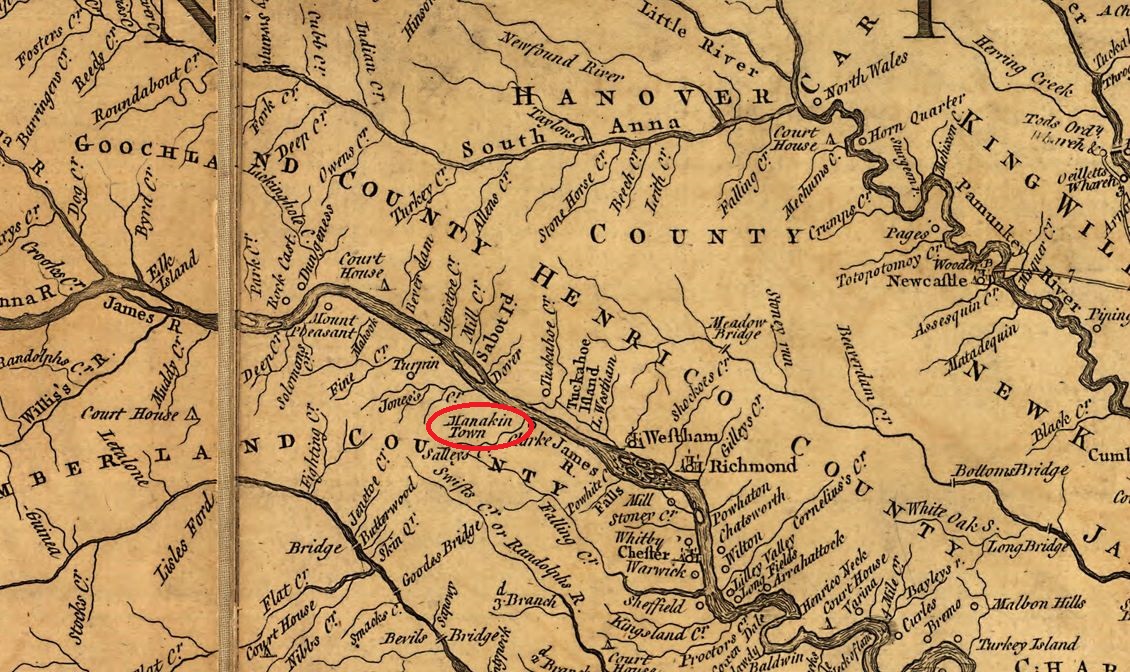
Manakin Town, in present-day Powhatan County, was a unique community made up of Huguenot (French Protestant) refugees who settled there in 1700-1701. Although free from the religious persecution they suffered in France, the settlers were not free from conflict. By 1707 their pastor, Claude Philippe1 de Richebourg, known as Mr. Philippe for short, was at odds with the vestry (governing body) of the Church of England parish created for the refugees.
Philippe had made a financial arrangement with some parishioners “without the participation of the vestry.” The vestrymen refused to raise the money, claiming that the minister’s action was “contrary to the laws and customs established in Virginia.”
Matters came to a head on 30 March 1707. At the end of the Sunday service, when it was customary to make parish announcements, vestryman Jacob Ammonet rose to announce the vestry’s disapproval of Philippe’s action, but the minister interrupted him. Philippe, “with a rage very unbecoming the place,” demanded that the clerk of the vestry give him the parish register book and threatened to bar all his opponents from communion.
Another vestryman, magistrate Abraham Sallé, then entered the fray. In his own words, he asked the minister “to have a little patience… I assurd him that the Vestry had no intention either to encroach upon his Rights or to give up their own… upon this, [Philippe] flew into a greater pasion than before,” telling the congregation that the vestry was not a lawful one.
Manakin Town highlighted on the Fry-Jefferson map ``of the most inhabited part of Virginia...`` (detail)
Fry, Joshua and Peter Jefferson, ``A map of the most inhabited part of Virginia containing the whole province of Maryland : with part of Pensilvania, New Jersey and North Carolina,`` London, 1755`{`?`}`.
Some of the minister’s allies, including the redundantly-named Michel Michel, began verbally abusing Sallé. Michel, as Sallé put it, “prest thro the whole congregation to get up to the place where I was, & then catching me by the coat, he threatened me very hardly, and by his Example, several of the crowd were heard to say, we must assasinate that damned fellow with the black beard… & several other violent Expressions, not very proper for the Church.”
As Philippe grew “lowder and more outrageous than any body,” Sallé, in his role as a justice of the peace, called for calm in the name of Queen Anne, “putting the people in mind of the day & occasion, & the place where they were.” This had no effect on the uproar, so Sallé “thought it prudent to withdraw.” Turning at the church door, he berated the pastor for being “a seditious person, & even the Chief of the Seditious.”
After the tumult died down, Philippe petitioned the governor’s council, accusing Sallé of slander and asking that the vestry be replaced. His petition has not survived the destruction of most of the colonial government’s papers, but Sallé’s reply still exists, as do the council minutes and the vestry minutes about this incident, which were recopied after Philippe “erased” them.
The council sided with Sallé and the vestry, ordering two commissioners to visit Manakin Town and smooth over the rift. Matters did not finally simmer down until 1710, when Governor Alexander Spotswood came in person and hammered out an agreement “that all the differences which have existed up to the present time… shall be entirely obliterated, as well with regard to what has been said as with reference to what has been written.”
Philippe left Manakin Town in 1711 or 1712, moving to North Carolina and then to South Carolina. Some of his supporters also left, but the community endured as a dispersed settlement rather than a true town. Church records were kept in French until 1750 or later, but by the end of the 1700s the Huguenot descendants were indistinguishable from their English neighbors except for their surnames. Pride in Huguenot ancestry continues through the Manakin Episcopal Church and the Huguenot Society of the Founders of Manakin.
Footnotes
- Spelled in various ways, but he signed his name “Philippe.”
Sources
Letter of Abraham Sallé, 1707 September 2, Colonial Papers, Library of Virginia.
“Vestry Book of King William Parish,” Virginia Magazine of History and Biography 11 (1904): 299, 426-429.
Executive Journals of the Council of Colonial Virginia, Vol. III, ed. H. R. McIlwaine (Richmond: Virginia State Library, 1928), 143, 162-163, 225.









